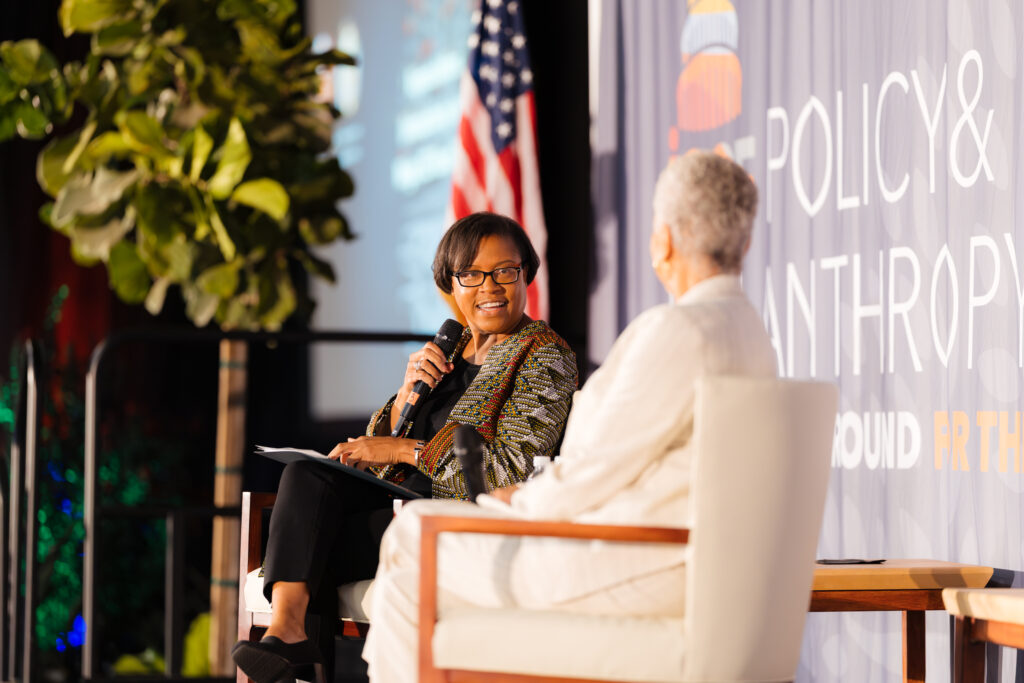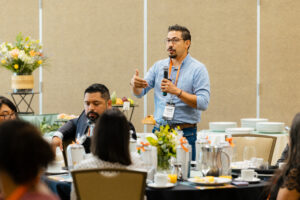
Paulette Brown-Hinds, publisher of Black Voice News and adviser to Press Forward Inland Empire.
Paulette Brown-Hinds has spent her career strengthening local news in California’s Inland Empire. As the second-generation publisher of Black Voice News, she’s helped transform the half-century-old outlet into a solutions-focused newsroom rooted in data and community partnerships. In 2023, she brought that experience to a new role: senior advisor of Press Forward Inland Empire.
The Inland Empire chapter is one of three Press Forward Locals in California, alongside Press Forward Central Valley and Press Forward Silicon Valley. Like all Locals, these chapters are fundraising and rallying support for journalism in their regions. But together, they’re also doing something new — collaborating to support local news across the entire state.
Brown-Hinds, joined by colleagues Armando Carmona and Charee Gillins, sees her chapter’s role as a convener. “The state is huge,” she said. “As new chapters develop, it presents an opportunity to talk more broadly about how to support journalism and what that looks like.”
Together, the California chapters are showing what collaboration can make possible.
Rooted in community, connected to a cause
Brown-Hinds’ vision for the California chapters of Press Forward is shaped by decades of work at the intersection of news, equity, and civic life. Beyond her leadership at Black Voice News, she has created new pathways for the field — including the Journalism Innovation Hub+Fund, launched in 2022 at the Inland Empire Community Foundation to strengthen local newsrooms and build a pipeline of diverse talent for the industry.
The following year, as part of her John S. Knight Journalism Fellowship, she convened the first California Journalism Philanthropy Summit at Stanford University. The one-day gathering in November 2023 brought together funders, community foundations, and journalism leaders from across the state to discuss local news as a civic priority — the first meeting of its kind.
“It was really eye-opening,” Brown-Hinds said. Private foundations and community foundations had been working in silos, and hadn’t yet seen each other as potential partners. “It became this way of connecting and networking folks interested in supporting journalism.”
That momentum carried forward. When Press Forward launched nationally, Brown-Hinds saw an opportunity. “I knew we needed to be part of a larger network,” she said. “We decided to become a Press Forward chapter.”
And so they did. Press Forward Inland Empire, led by the Inland Empire Community Foundation, was created in October 2024; Press Forward Central Valley, housed at the James B. McClatchy Foundation, launched the same month. Press Forward Silicon Valley, led by the Silicon Valley Community Foundation, had formed earlier that year.
Shared action in practice
The California chapters soon began meeting regularly as an informal coalition, calling themselves “the Press Forward chapters of California.” They trade updates, swap strategies, and consider how to amplify each other’s work. The long-term vision is to create a more formal Press Forward California, with shared infrastructure and collective advocacy.

Press Forward California chapters met up in Miami during a Press Forward workshop in February. Pictured left to right: Mauricio Palma, Keiona Williamson, Priscilla Enriquez, Graciela Moran, Misty Avila, Charee L. Gillins, Paulette Brown-Hinds and Armando Carmona. Photo courtesy of JBMF.
While the collaboration is nascent, Mauricio Palma, director of community partnerships at the Silicon Valley Community Foundation, said the potential is clear. “Presenting a united front is essential because the challenges facing local journalism in California are systemic, not isolated,” he explained. “Disinformation, news deserts, extractive platforms, and underinvestment in marginalized sectors are not unique to any single region. They are statewide and national in scope and demand a coordinated, cross-regional response.”
That united front has already been put into practice. When state leaders pivoted from legislation to a negotiated deal with Google that promised $250 million for local news over five years, the California chapters were later asked to weigh in. “We made a combined statement,” Brown-Hinds said. “We know this is not ideal, but it’s better than nothing. We’re supporting this in hopes that a good-faith effort will be made to continue to grow this funding for journalism.”
The chapters are also finding new ways to show up together. In early 2025, Priscilla Enriquez, CEO of the James B. McClatchy Foundation, organized a dinner at the Knight Media Forum co-hosted by the California Locals. The chapters also designed and developed a plenary session on journalism at the California Economic Summit, which was held in October.
Balancing statewide goals with local realities
California is vast, and each region has distinct needs. What works for Silicon Valley’s innovation economy may not resonate in the Inland Empire, where many communities face chronic underinvestment.
“Each chapter reflects a unique local context,” Palma said. “Whether it’s rural or urban, coastal or inland, we all share a common goal: to strengthen local journalism as a public good.”
Brown-Hinds is clear that collaboration cannot come at the expense of local context.
“The way we see our work is leveraging this collective of media organizations that are part of our core partners,” she explained. “We’re not trying to compete. A mistake some regional efforts make is building something that overshadows or competes with the media outlets already there. As someone who runs a media company, I take that very seriously.”
By coordinating at the state level while staying grounded locally, the California chapters can share strategies without imposing a one-size-fits-all model. Together, they send a stronger signal to funders, policymakers, and civic leaders that local news is both essential and worthy of investment.
A bright future within reach
Planning is already underway for the next California Journalism Philanthropy Summit, scheduled for January 2026 at the University of Southern California. The event will feature a keynote from investigative journalist and Nobel Peace Prize laureate Maria Ressa, alongside panels on philanthropy, public policy, and the impact of artificial intelligence on local journalism.
At the same time, the chapters are working to shape Press Forward California as a collective identity that connects statewide goals with local action. Whatever structure emerges, Brown-Hinds said, innovation will remain central.
“To raise money for journalism, we need to show that we’re innovating,” she explained. “People aren’t going to just give money to something that is dying.”

Armando Carmona, of Press Forward Inland Empire
Carmona agrees. “Paulette pushes all of us to think strategically and to innovate in a way that protects independent media and the free press.”
“Working with Paulette through Press Forward has been a joy and an affirmation of the values she seeded in that early convening,” Palma added. “Collaborating with the other local chapters reminds us that we are not working in isolation. Whether we are from the Central Valley, the Bay Area, or Southern California, we are united by a belief in local journalism as a civic good.”
Ultimately, the goal is to ensure that local news is recognized and resourced as essential infrastructure across California.
To Brown-Hinds, that future feels within reach. “There’s so much wealth in our state,” she said. “I don’t think of things from a deficit mindset. I think of opportunities.”
Katie Hawkins-Gaar is a freelance writer and journalism consultant. She previously worked at CNN and the Poynter Institute and now works with a variety of journalism support organizations, including Press Forward, the News Revenue Hub, and Report for America. She lives in Atlanta with her family.

